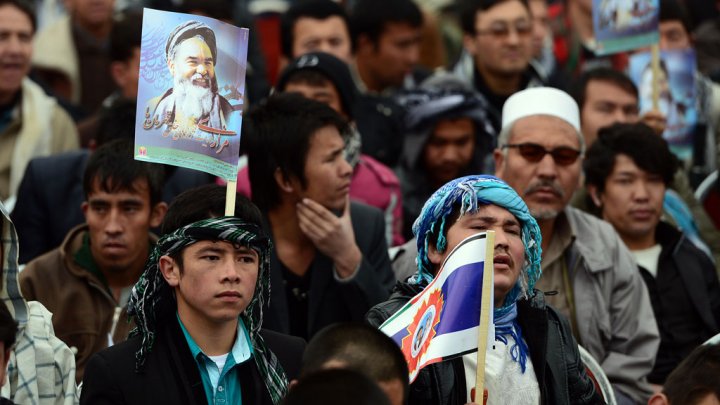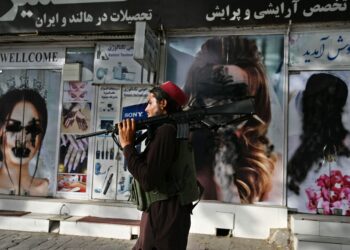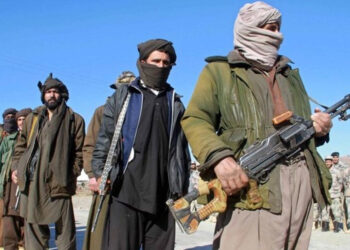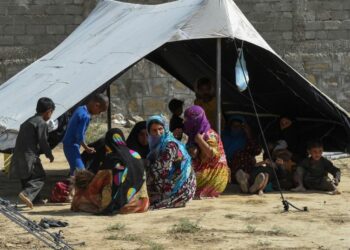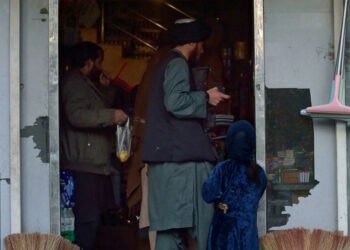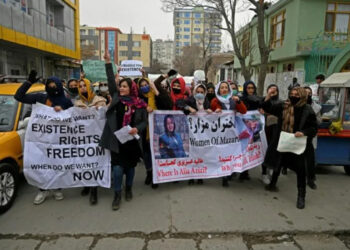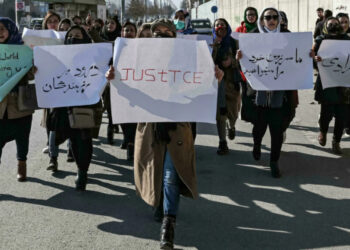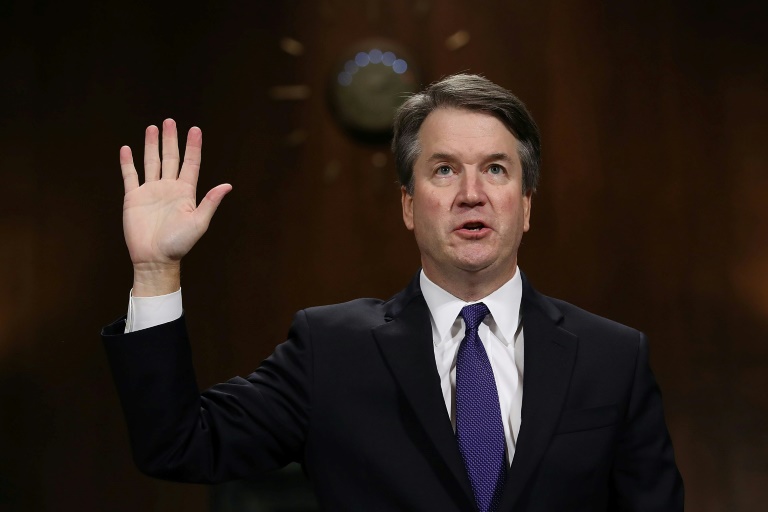The number of targeted killings of people belonging to the Hazara ethnic group has been growing rapidly in Afghanistan. Suicide bombers target their athletes, students, and communities in Kabul and provinces, where scores of Hazaras have been killed, injured or taken hostages, while their properties and businesses were destroyed.
In response, the “Afghan” state issued condemnation instead of boosting protection to this community whose members have been pioneers of social transformation. The National “Unity” Government (NUG) was formed through a power-sharing deal to harmonize and protect the society. But in reality, it has emerged as a tribal monocracy and just a façade, plagued by disunity and ethnonationalism.
Retorting recent attacks, Amrullah Saleh, a former “Afghan” spy chief, offered his services to train the Hazara youths in intelligence and security. It would allow them to protect themselves against what he called “an orchestrated project” to kill Hazaras systematically.
Disregarding the politics behind the Saleh’s reaction, it makes an implicit reference that Afghanistan is a state in disguise. Ethnic groups may have to take personal and communal measures, like it was recently showcased during the holy day of Ashura in Kabul, to keep their neighborhoods safe in the absence of an inclusive and legitimate government.
Perhaps, the NUG has become irrelevant and part of the problem in ethnic heterogeneous Afghanistan. Under NUG, Afghanistan is distressed and suffering from poverty, increasing insecurity, escalating ethnic tensions, loss of armed forces, civilian casualties and ethnicization of “commando” forces.
As the head of NUG, Ashraf Ghani, since his illegitimate rise to power, has been engaged in petty ethnopolitics by consolidating power and disempowering leaders of other ethnic groups. He has used his position to “incapacitate” General Abdul Rashid Dostum, an Uzbek leader, the incumbent “Vice President” on the accusation of raping an elderly male political rival. Dostum denied the accusations.
Attempting to further weaken Dostum’s socio-political basis in Afghanistan, in July, Ghani ordered the arbitrary arrest of Dostum’s right-hand man, Nizamuddin Qaisari, an anti-Taliban Uzbek commander in Faryab province. His arrest resulted in killings, torture, and disappearance, far worse than an accusation of “rape,” but Ghani can’t be held accountable.
Recently, “Ghani’s commandos” had attempted to arrest an anti-Taliban Hazara commander, known as Alipoor, in Ghor province that triggered community uprising against the “commandos.” Initial reports indicate that “commandos” have failed to make the arrest and have caused casualties.
Ghani takes such arbitrary measures against ethnic groups while the Taliban, predominantly from his ethnic group, threatens more than 70 percent of Afghanistan.
Tribal-Monocracy: the Slayer of “Afghan” State
Nevertheless, the source of ethnopolitics within Afghanistan is the concentration of power in the hands of one “tribalist,” a tribal monocracy enigmatically provis
According to Barnett Rubin, who “crafted” the 2004 Constitution under the supervision of Zalmay Khalilzad, Hamid Karzai and Ghani, the presidential system was preferred, as “everyone assumed that, for the foreseeable future, an elected president would be Pashtun, and, furthermore, a Pashtun approved by the U.S.”
To reason why, Rubin argued, “The origin of the Afghan state in an empire is reflected in its de jure unitary, centralized character: the administration was supposed to be an instrument for the center to control the periphery, not for local communities to exercise self-government.”
It is unclear who was “everyone” for Rubin. The 2004 Constitution “crafting” was “inaccessible to the public.” Nonetheless, Rubin’s assumption on ethnicization of power and his reference to “the Afghan state in an empire” help us understand how he combined the two to lay the foundations for the “Afghan” tribal-monocracy, which is the “wicked problem” of Afghanistan in recent times.
Centralization and ethnicization of the system is the slayer of the state in the multi-ethnic Afghanistan. It does not only escalate inter-ethnic mistrust and rivalries among various ethnic aristocracies but also spirals an intra-Pashtun power-grabbing smear campaign between Ghilzai and Durrani Pashtuns. As a result, Afghanistan remains a state in disguise that is neither able to fully control the center nor the periphery.
Inter- and intra-ethnic resentments fuel extremist groups like the Taliban. When citizens take up arms to defend their communities against terrorism, they become “warlords.” Thus, Saleh’s military training offer to the Hazara youth is problematic since the “Afghan” state, albeit in disguise, will deal with non-Pashtun armed tribesmen as “warlords” like Qaisari and Alipoor.
According to Alexander Thier, a prominent constitutional expert, “In Afghanistan’s current political reality, short-term interests in the consolidation of authority won out over long-term considerations of power sharing… grant of power to the unaccountable threatens the democratic system and protection of individual rights… Collegiate systems of government which avoid vesting too much power in one person can be important in maintaining a degree of stability” in Afghanistan.
Thier concluded, “Defusing ethnic tensions will rest, in part, on having alternative loci of power where local and regional power-holders feel that they can exert a measure of control. Failure to create such loci risks causing those regions to seek alternative political arrangements through force.”
“Alternative Political Arrangements”
The Grand National Coalition of Afghanistan (GNCA) has not only emerged as an “alternative political arrangement” but also as the “antithesis” to the current “Afghan” tribal-monocracy. The inter-ethnic synchronization the GNCA members display as an opposition bloc, united in diversity, resembles Afghanistan’s fitness for a “state-nation” political model like India, Switzerland, and Canada.
In a “state-nation,” ethnic diversity is valued and accommodated as part of the state’s multiculturalism policies as opposed to the nation-state’s coercive push for forced homogenization on the basis of fascism and ethnonationalism ideologies, as happened in Italy, Spain and Germany a century ago.
Afghanistan seems to have been suffering from “nation-state” fallacy since 1880. The GNCA leaders can change this if they remain united and think about the long-term future of Afghanistan. Given the socio-political support they get within Afghanistan’s diverse ethnic groups, they are destined to take the country’s leadership when the NUG term ends next year.
Although Afghanistan is yet to experience free and fair elections, the ability of political groupings to form a government in the post-“elections” deal making is important, as happened in previous presidential elections. The GNCA has all it takes to form the next government. Ghani is fully aware of this.
Hence, the resignation of Hanif Atmar from the postition of the National Security Advisor, and the appointment of Zalmay Khalilzad as an advisor to the U.S. Secretary of State on Afghanistan, may all be seen as Ghani’s attempts to counter the GNCA’s growing influence.
Atmar’s “departure” could be a tactical maneuver to tap into GNCA and potentially divide this powerful opposition alliance before April 2019, when the presidential election is scheduled to take place.
Atmar has been an associate of Ghani for decades and his loyalty does not change overnight. The GNCA leaders know this. Additionally, Atmar was at odds with the GNCA leaders throughout his time as Ghani’s NSA. Hence, it will be difficult for Atmar to succeed in dividing the GNCA.
Ghani might have lobbied for Khalilzad’s comeback to broker a “peace” deal with the Taliban that would hand Ghani a wild card for extending his term. This also seems futile.
Firstly, Khalilzad could only land an advisory role, not what Ghani might have hoped for – the Special Envoy with executive powers. Secondly, Khalilzad is rumored to have angered John Bass, a highly influential incumbent U.S. Ambassador to Kabul, by leaking some classified information. Ambassador Bass will most likely contain Khalilzad’s influence in Kabul.
Lastly, Ghani’s reputation as a deceitful politician (since he had betrayed General Dostum and other political allies), his image among the Taliban as an “American puppet,” and his intra-Pashtun clan-politics make the “peace deal” a long shot, even with Khalilzad onboard. According to Giustozzi and Ali, despite “75 percent of the appointments made by” Ghani during his first year in office are Pashtuns, he has been favoring Ghilzai Pashtuns.
What Could Happen?
For peace to transpire, the Taliban need to make peace with the GNCA leaders who fought and ousted them with the U.S. support in 2001. Thus, they are more likely to engage with the GNCA’s “mujahidin” leaders than “secular” Ghani, whose temporal personality was exposed through several religious blunders on live TV.
Ismail Khan, the former governor of Herat province, is tipped to lead the GNCA’s peace process. Earlier this year, the Taliban immediately welcomed his call for peace talks.
Given the growing irrelevance of Ghani’s tribal monocracy, and the emergence of GNCA as “alternative political arrangements,” as well as the possible GNCA-Taliban reconciliation, the U.S.-led international representations might withdraw support from Ghani and Khalilzad whose agenda has caused the American people “blood and treasure” in Afghanistan for years.
This shift would avert the “Afghan” menace of ethnonationalism and avail the multi-ethnic Afghanistan with new opportunities to start fresh – away from tribal monocracy and towards an inclusive democracy based on unity in diversity. With a democratic constitutionalism as a non-domination and institutional equality process on the state-nation model, Afghanistan could be transformed from a state in disguise to Switzerland of South and Central Asia.
Only then, Hazara and other ethnic youths won’t need military training to protect their neighborhoods. Instead, they would be offered opportunities to transform their communities into Geneva-like cities.
Disclaimer: The views and opinions expressed here are those of the author and do not necessarily reflect the editorial position of The Globe Post.

